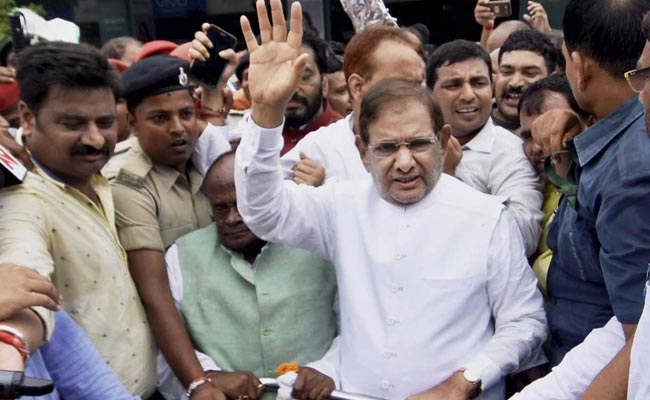Sharad Yadav is left with very few options now. With typical bravado, he may have told his former colleagues "It's my way or the highway", but it is doubtful how far he can walk along the highway he has chosen for himself. By opting for an ideological high ground and refusing to endorse Nitish Kumar's alliance with the BJP, Sharad Yadav has left himself rather isolated and vulnerable.
However, it is a moot question whether Nitish Kumar jumped ship a little too early. Being an architect of the 2015 Maha-Gathbandhan in Bihar, which brought together Lalu Prasad and the Congress under his umbrella, Nitish Kumar was being seen by many as the prospective leader of a non-BJP alliance that could challenge Narendra Modi's overwhelming political supremacy in time for the 2019 general election. But the alacrity with which then Maha-Gathbandhan unravelled left even its constituents breathless. While Nitish Kumar, ultra-conscious of his squeaky-clean image, was most uneasy when Lalu Prasad's children, including his Deputy Chief Minister Tejaswi Yadav, got embroiled in scam after scam, Sharad Yadav did not vocally take any position. Over the years, Sharad Yadav was content playing a national role as JD(U) president and leader of its parliamentary party. His relations with Lalu Yadav had also become prickly over the years as both were contenders for the Yadav vote bank.
In this race, Lalu Prasad was always way ahead of Sharad Yadav who is not quite a grassroots leader although he likes to believe he is. Sharad Yadav moreover is not a native leader of Bihar, having been originally a resident of Jabalpur in Madhya Pradesh from where he won his first Lok Sabha election as a firebrand students' leader in 1977. He later shifted his base to Madhepura in Bihar from where he is currently the MP.
Interestingly, Nitish Kumar has never positioned himself as a caste-based leader because the Kurmi community to which he belongs is numerically not predominant anywhere. But they are an affluent and influential OBC community, capable of standing up to Yadav domination. Nitish Kumar's popularity cuts across caste and he enjoys significant support among upper castes that generally support the BJP. By retrieving Bihar from years of lawlessness and Lalu Prasad's "Jungle Raj", Nitish gained the confidence of most non-Yadav communities. But the Yadavs and Muslims, the M-Y combine, so to speak, remains steadfastly with Lalu Prasad as the 2015 Assembly results demonstrated.
So who gains from the Nitish-Sharad split? Frankly, Nitish has little to lose because Sharad Yadav does not bring much to the table. If he sets about to a build a new party from scratch, he will face formidable problems generating both human and material resources. In spite of the corruption charges against them, it is most unlikely that his core supporters will desert Lalu Prasad. He and his family members will, no doubt, face harassment with the judiciary, but in all probability, his sons Tejaswi and Tej Pratap will be readily accepted as Lalu Prasad's successors and inherit the bulk of the M-Y vote bank. In the long run, Sharad Yadav may be compelled to accept Lalu's suzerainty and be content with his own Lok Sabha seat.

Sharad Yadav was today removed as the leader of Janata Dal (United) in Rajya Sabha (file photo)
But where does the turn of events leave Nitish Kumar? He too faces isolation as prospects of his reviving a non-BJP formation will no longer be credible. It was Nitish Kumar who had proactively broken the alliance with BJP and virtually insulted Narendra Modi, then Chief Minister of Gujarat, by returning the donation of Rs 5 crore given to Bihar as flood relief in 2008. Their relations soured further over the years, but exigencies brought them together again. In his latest avatar, Nitish Kumar has been compelled to accept the BJP's domination and hereafter will be made to play second fiddle in the alliance which, formally, he leads.
As the BJP's grip over national politics tightens and more states come under its sway, Nitish Kumar will have to reconcile to playing a less important role. Even in Bihar, the BJP leadership will slowly but surely seek to erode Nitish Kumar's individual base and emerge as the state's dominant party. With Ram Vilas Paswan already in the BJP fold, the NDA's reach in Bihar is today bigger than other parties or combines.
In a sense, both Nitish Kumar and Sharad Yadav bartered away a large degree of their own maneuverability. The pragmatist that he is, Nitish wasted no time in tying up with the BJP to remain Chief Minister. His options are foreclosed at least till 2019. Sharad Yadav has lost more than just his clout. He may soon be forced to eat humble pie and come under Lalu Prasad's or the Congress's umbrella.
But as they say, there are no full stops in politics. With socialists, there are no commas either. They can switch alliances, float and discard parties and make ideological somersaults at the drop of a hat. Though Sharad Yadav is the main loser from the churning in Bihar today, who knows if he wouldn't have the last laugh some years down the line?
(Dr. Chandan Mitra is a journalist, currently Editor of The Pioneer Group of Publications. He is also former BJP MP, Rajya Sabha.)
Disclaimer: The opinions expressed within this article are the personal opinions of the author. The facts and opinions appearing in the article do not reflect the views of NDTV and NDTV does not assume any responsibility or liability for the same.


